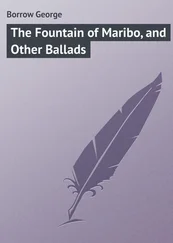George Borrow - The Bible in Spain. Volume 2 of 2
Здесь есть возможность читать онлайн «George Borrow - The Bible in Spain. Volume 2 of 2» — ознакомительный отрывок электронной книги совершенно бесплатно, а после прочтения отрывка купить полную версию. В некоторых случаях можно слушать аудио, скачать через торрент в формате fb2 и присутствует краткое содержание. ISBN: , Жанр: foreign_prose, Путешествия и география, foreign_language, на английском языке. Описание произведения, (предисловие) а так же отзывы посетителей доступны на портале библиотеки ЛибКат.
- Название:The Bible in Spain. Volume 2 of 2
- Автор:
- Жанр:
- Год:неизвестен
- ISBN:http://www.gutenberg.org/ebooks/35676
- Рейтинг книги:4 / 5. Голосов: 1
-
Избранное:Добавить в избранное
- Отзывы:
-
Ваша оценка:
- 80
- 1
- 2
- 3
- 4
- 5
The Bible in Spain. Volume 2 of 2: краткое содержание, описание и аннотация
Предлагаем к чтению аннотацию, описание, краткое содержание или предисловие (зависит от того, что написал сам автор книги «The Bible in Spain. Volume 2 of 2»). Если вы не нашли необходимую информацию о книге — напишите в комментариях, мы постараемся отыскать её.
The Bible in Spain. Volume 2 of 2 — читать онлайн ознакомительный отрывок
Ниже представлен текст книги, разбитый по страницам. Система сохранения места последней прочитанной страницы, позволяет с удобством читать онлайн бесплатно книгу «The Bible in Spain. Volume 2 of 2», без необходимости каждый раз заново искать на чём Вы остановились. Поставьте закладку, и сможете в любой момент перейти на страницу, на которой закончили чтение.
Интервал:
Закладка:
Antonio now descended. “Follow me,” said he; “his worship the alcalde will be ready to receive you in a moment.” Sebastian and myself followed him upstairs to a room, where, seated behind a table, we beheld a young man of low stature, but handsome features, and very fashionably dressed. He appeared to be inditing a letter, which, when he had concluded, he delivered to a secretary to be transcribed. He then looked at me for a moment fixedly, and the following conversation ensued between us: —
Alcalde . – I see that you are an Englishman, and my friend Antonio here informs me that you have been arrested at Finisterre.
Myself . – He tells you true; and but for him I believe that I should have fallen by the hands of those savage fishermen.
Alcalde . – The inhabitants of Finisterre are brave, and are all liberals. Allow me to look at your passport? Yes, all in form. Truly it was very ridiculous that they should have arrested you as a Carlist.
Myself . – Not only as a Carlist, but as Don Carlos himself.
Alcalde . – Oh! most ridiculous; mistake a countryman of the grand Baintham for such a Goth!
Myself . – Excuse me, sir, you speak of the grand somebody.
Alcalde . – The grand Baintham. He who has invented laws for all the world. I hope shortly to see them adopted in this unhappy country of ours.
Myself . – Oh! you mean Jeremy Bentham. Yes! a very remarkable man in his way.
Alcalde . – In his way! in all ways. The most universal genius which the world ever produced: – a Solon, a Plato, and a Lope de Vega.
Myself . – I have never read his writings. I have no doubt that he was a Solon; and as you say, a Plato. I should scarcely have thought, however, that he could be ranked as a poet with Lope de Vega.
Alcalde . – How surprising! I see, indeed, that you know nothing of his writings, though an Englishman. Now, here am I, a simple alcalde of Galicia, yet I possess all the writings of Baintham on that shelf, and I study them day and night.
Myself . – You doubtless, sir, possess the English language.
Alcalde . – I do. I mean that part of it which is contained in the writings of Baintham. I am most truly glad to see a countryman of his in these Gothic wildernesses. I understand and appreciate your motives for visiting them: excuse the incivility and rudeness which you have experienced. But we will endeavour to make you reparation. You are this moment free: but it is late; I must find you a lodging for the night. I know one close by which will just suit you. Let us repair thither this moment. Stay, I think I see a book in your hand.
Myself . – The New Testament.
Alcalde . – What book is that?
Myself . – A portion of the sacred writings, the Bible.
Alcalde . – Why do you carry such a book with you?
Myself . – One of my principal motives in visiting Finisterre was to carry this book to that wild place.
Alcalde . – Ha, ha! how very singular. Yes, I remember. I have heard that the English highly prize this eccentric book. How very singular that the countrymen of the grand Baintham should set any value upon that old monkish book!
It was now late at night, and my new friend attended me to the lodging which he had destined for me, and which was at the house of a respectable old female, where I found a clean and comfortable room. On the way I slipped a gratuity into the hand of Antonio, and on my arrival, formally, and in the presence of the alcalde , presented him with the Testament, which I requested he would carry back to Finisterre, and keep in remembrance of the Englishman in whose behalf he had so effectually interposed.
Antonio . – I will do so, your worship, and when the winds blow from the north-west, preventing our launches from putting to sea, I will read your present. Farewell, my captain, and when you next come to Finisterre, I hope it will be in a valiant English bark, with plenty of contraband on board, and not across the country on a pony, in company with nuveiros and men of Padron.
Presently arrived the handmaid of the alcalde with a basket, which she took into the kitchen, where she prepared an excellent supper for her master’s friend. On its being served up the alcalde bade me farewell, having first demanded whether he could in any way forward my plans.
“I return to Saint James to-morrow,” I replied, “and I sincerely hope that some occasion will occur which will enable me to acquaint the world with the hospitality which I have experienced from so accomplished a scholar as the Alcalde of Corcuvion.”
CHAPTER XXXI
Corunna – Crossing the Bay – Ferrol – The Dock-yard – Where are we now? – Greek Ambassador – Lantern-Light – The Ravine – Viveiro – Evening – Marsh and Quagmire – Fair Words and Fair Money – The Leathern Girth – Eyes of Lynx – The Knavish Guide.
From Corcuvion I returned to St. James and Corunna, and now began to make preparation for directing my course to the Asturias. In the first place I parted with my Andalusian horse, which I considered unfit for the long and mountainous journey I was about to undertake, his constitution having become much debilitated from his Gallegan travels. Owing to horses being exceedingly scarce at Corunna, I had no difficulty in disposing of him at a far higher price than he originally cost me. A young and wealthy merchant of Corunna, who was a national guardsman, became enamoured of his glossy skin and long mane and tail. For my own part, I was glad to part with him for more reasons than one; he was both vicious and savage, and was continually getting me into scrapes in the stables of the posadas where we slept or baited. An old Castilian peasant, whose pony he had maltreated, once said to me, “Sir Cavalier, if you have any love or respect for yourself, get rid, I beseech you, of that beast, who is capable of proving the ruin of a kingdom.” So I left him behind at Corunna, where I subsequently learned that he became glandered and died. Peace to his memory!
From Corunna I crossed the bay to Ferrol, whilst Antonio with our remaining horse followed by land, a rather toilsome and circuitous journey, although the distance by water is scarcely three leagues. I was very sea-sick during the passage, and lay almost senseless at the bottom of the small launch in which I had embarked, and which was crowded with people. The wind was adverse, and the water rough. We could make no sail, but were impelled along by the oars of five or six stout mariners, who sang all the while Gallegan ditties. Suddenly the sea appeared to have become quite smooth, and my sickness at once deserted me. I rose upon my feet and looked around. We were in one of the strangest places imaginable. A long and narrow passage overhung on either side by a stupendous barrier of black and threatening rocks. The line of the coast was here divided by a natural cleft, yet so straight and regular that it seemed not the work of chance but design. The water was dark and sullen, and of immense depth. This passage, which is about a mile in length, is the entrance to a broad basin, at whose farther extremity stands the town of Ferrol.
Sadness came upon me as soon as I entered this place. Grass was growing in the streets, and misery and distress stared me in the face on every side. Ferrol is the grand naval arsenal of Spain, and has shared in the ruin of the once splendid Spanish navy: it is no longer thronged with those thousand shipwrights who prepared for sea the tremendous three-deckers and long frigates, the greater part of which were destroyed at Trafalgar. Only a few ill-paid and half-starved workmen still linger about, scarcely sufficient to repair any guarda costa 10 10 In Spanish, guardacostas .
which may put in dismantled by the fire of some English smuggling schooner from Gibraltar. Half the inhabitants of Ferrol 11 11 More correctly, el Ferrol or farol , the lighthouse. Nothing can more strikingly give the lie to the conventional taunt that Spain has made no progress in recent years than the condition of the modern town of el Ferrol compared with the description in the text. It is now a flourishing and remarkably clean town of over 23,000 inhabitants, with an arsenal not only magnificent in its construction, but filled with every modern appliance, employing daily some 4000 skilled workmen, whose club ( el liceo de los artesanos ) might serve as a model for similar institutions in more “advanced” countries. It comprises a library, recreation-room, casino, sick fund, benefit society, and school; and lectures and evening parties, dramatic entertainments, and classes for scientific students, are all to be found within its walls.
beg their bread; and amongst these, as it is said, are not unfrequently found retired naval officers, many of them maimed or otherwise wounded, who are left to pine in indigence: their pensions or salaries having been allowed to run three or four years in arrear, owing to the exigencies of the times. A crowd of importunate beggars followed me to the posada , and even attempted to penetrate to the apartment to which I was conducted. “Who are you?” said I to a woman who flung herself at my feet, and who bore in her countenance evident marks of former gentility. “A widow, sir,” she replied, in very good French; “a widow of a brave officer, once admiral of this port.” The misery and degradation of modern Spain are nowhere so strikingly manifested as at Ferrol.
Интервал:
Закладка:
Похожие книги на «The Bible in Spain. Volume 2 of 2»
Представляем Вашему вниманию похожие книги на «The Bible in Spain. Volume 2 of 2» списком для выбора. Мы отобрали схожую по названию и смыслу литературу в надежде предоставить читателям больше вариантов отыскать новые, интересные, ещё непрочитанные произведения.
Обсуждение, отзывы о книге «The Bible in Spain. Volume 2 of 2» и просто собственные мнения читателей. Оставьте ваши комментарии, напишите, что Вы думаете о произведении, его смысле или главных героях. Укажите что конкретно понравилось, а что нет, и почему Вы так считаете.












